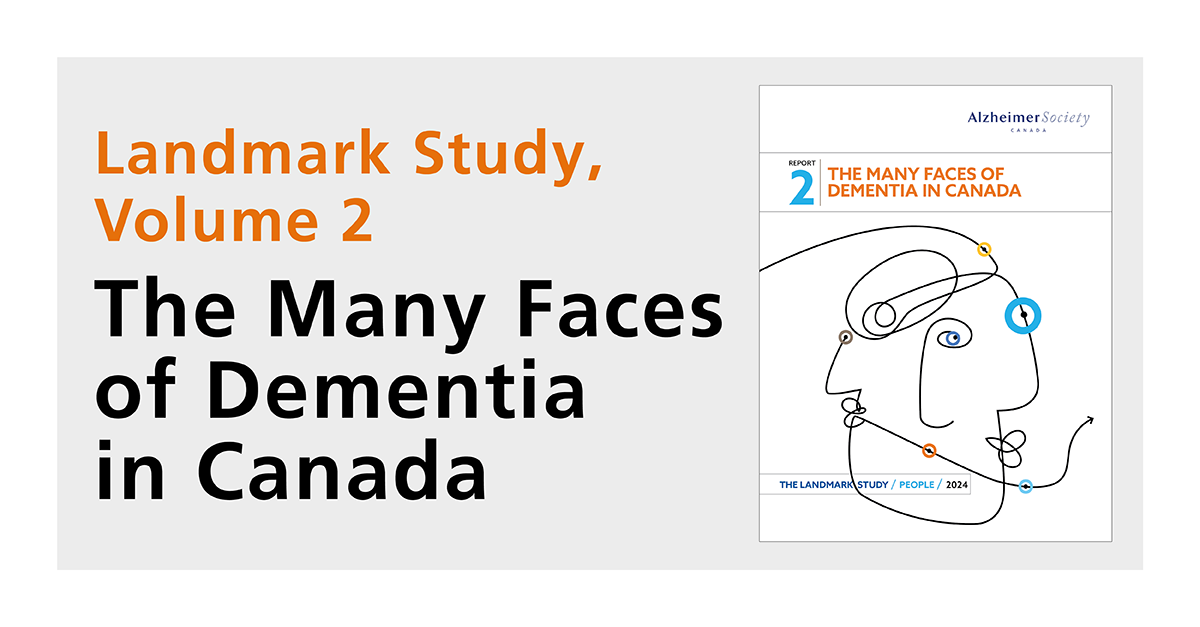Around the world, the scientific community is devoting substantial effort and funding to dementia research. Researchers are looking for ways to prevent the disease, to improve quality of life for people living with dementia and to ultimately find a cure to eradicate the disease.
On this page:
- Apply now! Proof of Concept Grant competition 2025
- Landmark Study 2: The Many Faces of Dementia in Canada
- Alzheimer Society Research Program Awards
- Alzheimer Society of Manitoba Graduate Student Fellowship Award
- Landmark Study 1: Navigating the Path Forward
- Participate in Research
- Research Funding
Apply now! Proof of Concept Grant competition 2025
We are pleased to announce the launch of the application process for the Proof of Concept Grant for the 2025/26 competition, a key funding opportunity within the Alzheimer Society Research Program, dedicated to advancing innovation and excellence in dementia research.
The Proof of Concept Grant offers $100,000 over a period of up to three years to support researchers pursuing innovative, high-risk, high-reward hypotheses in the field of Alzheimer’s disease and related dementias.
Applications will be pre-screened through a Letter of Intent (LOI) process. Successful LOI applicants will be invited to submit a full application for peer review later this summer.
We invite researchers with bold and challenging ideas to apply and contribute to transformative advances in dementia research.
The LOI form is available now with submissions due by July 21, 2025.
For more information and to read the Proof of Concept LOI guidelines, visit the Alzheimer Society of Canada website.
Key Dates:
Launch Proof of Concept LOI Process – June 6, 2025, 8:00 a.m. ET
LOI Submission Deadline – July 21, 2025, 5:00 p.m. ET
Results of LOI Pre-Screen Announced to Applicants – August 2025
The Many Faces of Dementia in Canada
 Dementia is a major public health problem in Canada and around the world, affecting millions of people. Research indicates significant variations in the risk of development, prevalence, clinical presentation, and health outcomes across various communities in Canada, including differences in ethnicity, race, sex, gender and age.
Dementia is a major public health problem in Canada and around the world, affecting millions of people. Research indicates significant variations in the risk of development, prevalence, clinical presentation, and health outcomes across various communities in Canada, including differences in ethnicity, race, sex, gender and age.
With the rapid rise of our aging population in Canada, this is one of the first studies that seeks to better understand the many faces of dementia, so that no one is left behind and we’re able to serve their specific needs and those in their circle of care.
Understanding the unique needs and experiences of diverse communities is a key step in improving the quality of life for people living with dementia and their caregivers.
Click here to view the full report
Click here to view the Provincial Data Report for Manitoba
Alzheimer Society Research Program Award 2025
The 2025 Alzheimer Society Research Program (ASRP) has awarded over $5.1 million to 37 researchers across the country to advance research related to all forms of dementia and find more effective means to diagnose, treat and eventually stop the disease, as well as improve day-to-day life and care.
This year, two Manitoban researchers have been awarded funding through the ASRP, both generously co-funded by Research Manitoba.
Dr. Heather Campbell-Enns, Canadian Mennonite University
 Title: A Pilot Study of Ethnocultural Approaches to Family-Provided Dementia Care
Title: A Pilot Study of Ethnocultural Approaches to Family-Provided Dementia Care
Award/Grant: New Investigator Grant
The intergenerational family plays a crucial role in providing essential care for persons living with dementia and, despite the substantial involvement of adult children and grandchildren, intergenerational care remains understudied. Additionally, studying caregiving from cultural perspectives is also needed since caregiving is influenced by cultural knowledge, preferences, and resources.
This study seeks to develop a better understanding of intergenerational family caregiving across immigrant cultural groups; it will test how feasible and acceptable it is to use multiple research methods to study intergenerational family care experiences, such as family group interviews. Family members will also be invited to collaborate to create digital stories about their caregiving experiences from their cultural perspective.
This research will identify themes of importance for intergenerational family caregivers from multiple cultural perspectives, share dementia care stories, and develop a better understanding of how suitable multiple research methods are to examine dementia care from cultural perspectives.
Ms. Parisa Tabeshmehr, University of Manitoba
 Title: Impact of disrupting TRPM2 function in Alzheimer’s Disease
Title: Impact of disrupting TRPM2 function in Alzheimer’s Disease
Award/Grant: Doctoral Award
Alzheimer’s disease (AD) is a brain disorder that causes memory loss and cognitive decline, affecting 1 in 9 people over 65. There is no cure, and treatments only manage symptoms. A hallmark of AD is the accumulation of amyloid-beta (Aβ), which disrupts neuronal communication and activates harmful inflammation in brain immune cells.
My lab has identified TRPM2, an ion channel involved in these processes, as a promising drug target. With collaborators, we are testing JNJ, a selective and well-tolerated TRPM2 blocker, to determine if it can reduce Aβ-induced damage. My experiments in cells and mice will evaluate whether JNJ prevents memory loss by preserving neuronal signaling and reducing inflammation.
Positive results would support TRPM2 inhibition as a novel treatment and guide development of improved TRPM2 blockers with better brain penetration and stability. Unlike past Aβ-targeting therapies, this approach may more effectively reduce the toxic soluble Aβ linked to memory decline in AD.
Click here to find out more about ASRP, funded researchers, research news and accountability reports.
Alzheimer Society of Manitoba Graduate Student Fellowship Award 2024-2025
Each year, the Alzheimer Society of Manitoba awards funding fellowships valued at $4,000 each to two graduate students who have demonstrated outstanding interest or commitment to dementia research.
These awards are offered to encourage graduate student interest in research in dementia. Specifically:
- to enhance knowledge about the cause, treatment, cure and effects of dementia in the biomedical and psychosocial domains
- to increase knowledge about the care of people living with dementia by formal and informal caregivers
- to encourage graduate student interest in dementia
- to stimulate graduate student research activity in dementia
The two graduate students receiving funding this year are:
- Tobi Olanipekun – awarded for his research investigating a novel treatment for targeting epigenetic changes in Alzheimer’s disease.
- Christian Humphreys – awarded for his research on the protein Pannexin 2 (Panx2) and its effects on communication between brain cells.
To learn more about the Graduate Student Fellowship award and how to apply, visit the University of Manitoba website.
Navigating the Path Forward For Dementia in Canada
Canada needs bold action to head off an impending dementia care crisis. This report from the Alzheimer Society of Canada, released in September 2022, says actions to reduce risk have the potential to change the future of dementia in Canada — if governments act now.
Navigating the Path Forward for Dementia in Canada is the first volume of the Landmark Study, which represents the most significant update of the prevalence of dementia in Canada and its forecasted growth over the next 30 years.
Click here to read the full report
Click here to view the provincial findings for Manitoba
Participate in Research
Click here to find out how you can participate.
Click here for National studies looking for Canadians looking to participate.
Research Funding
Financial gifts directed towards research are crucial to help find better treatments and ultimately a cure for Alzheimer’s disease and other forms of dementia. Without proper funding, research breakthroughs go undiscovered.
Click here to make a donation today!



